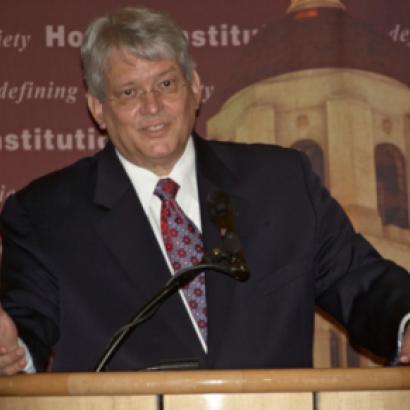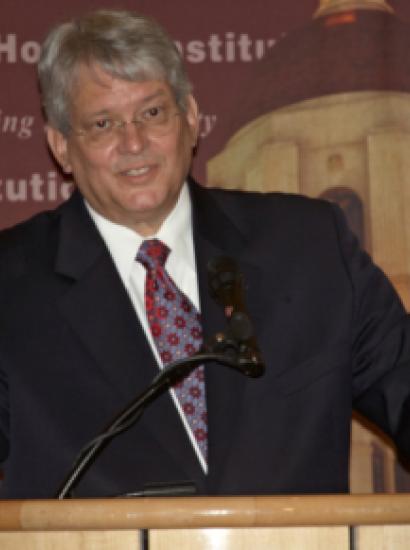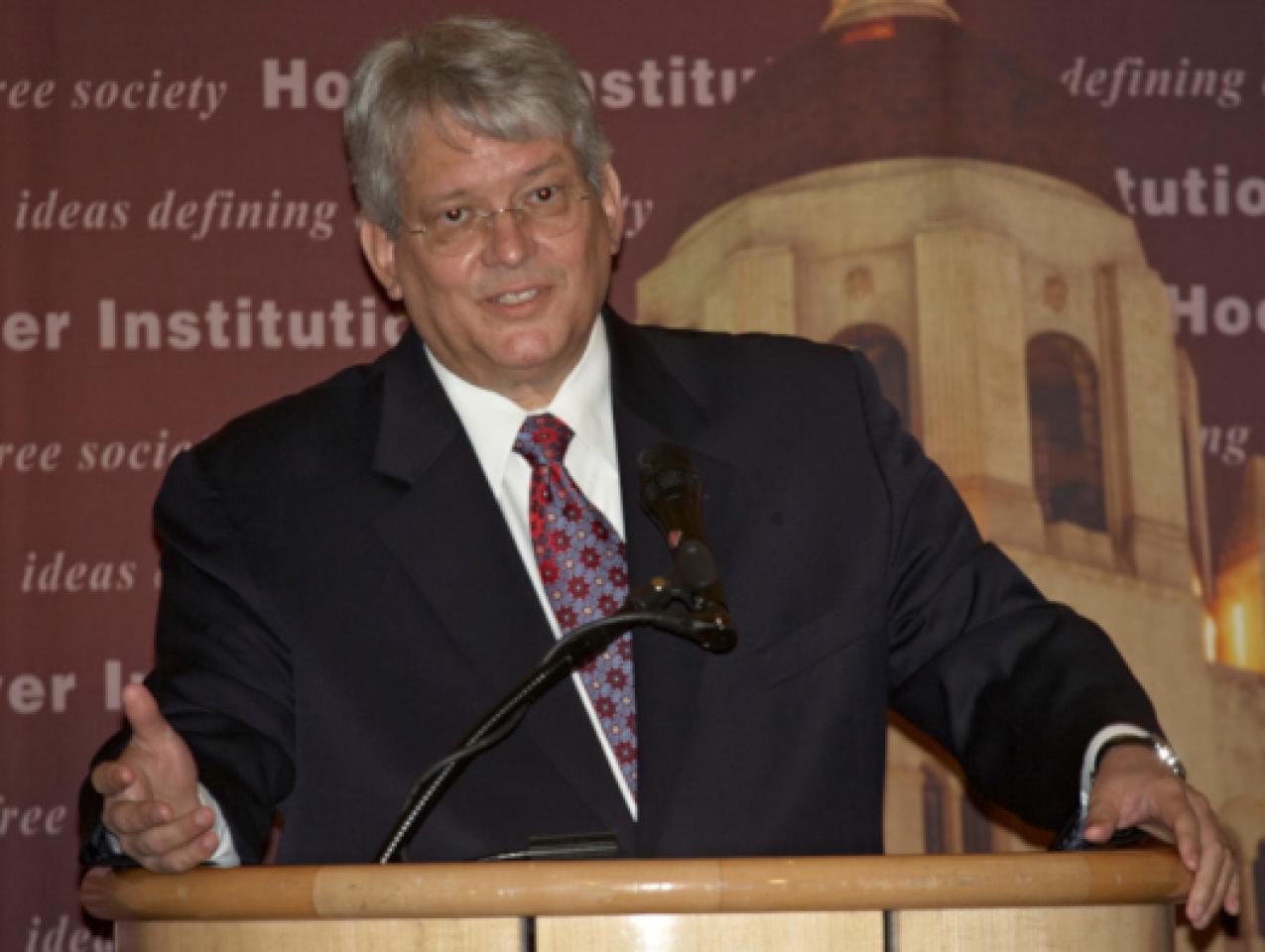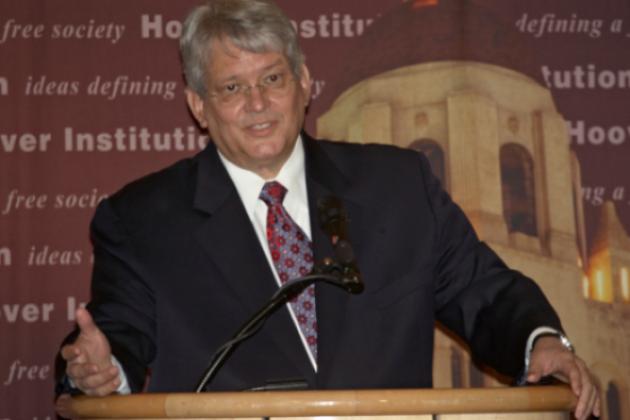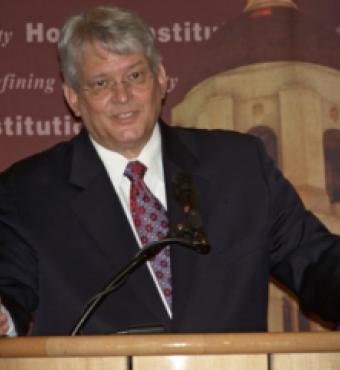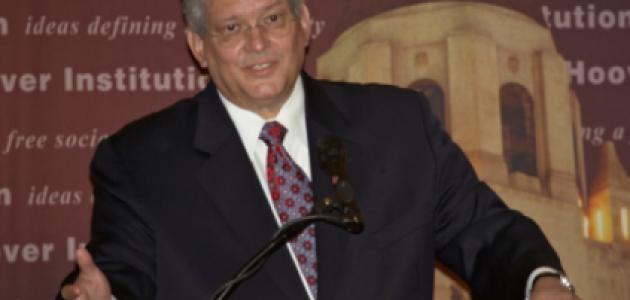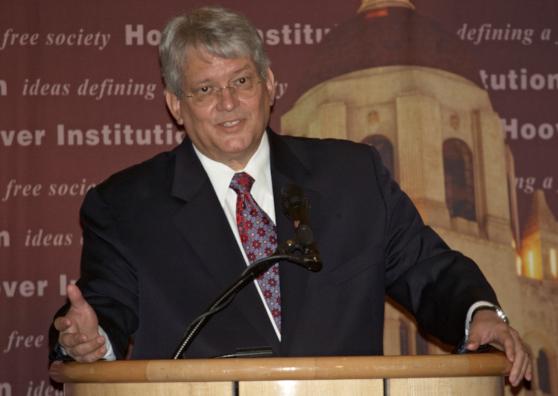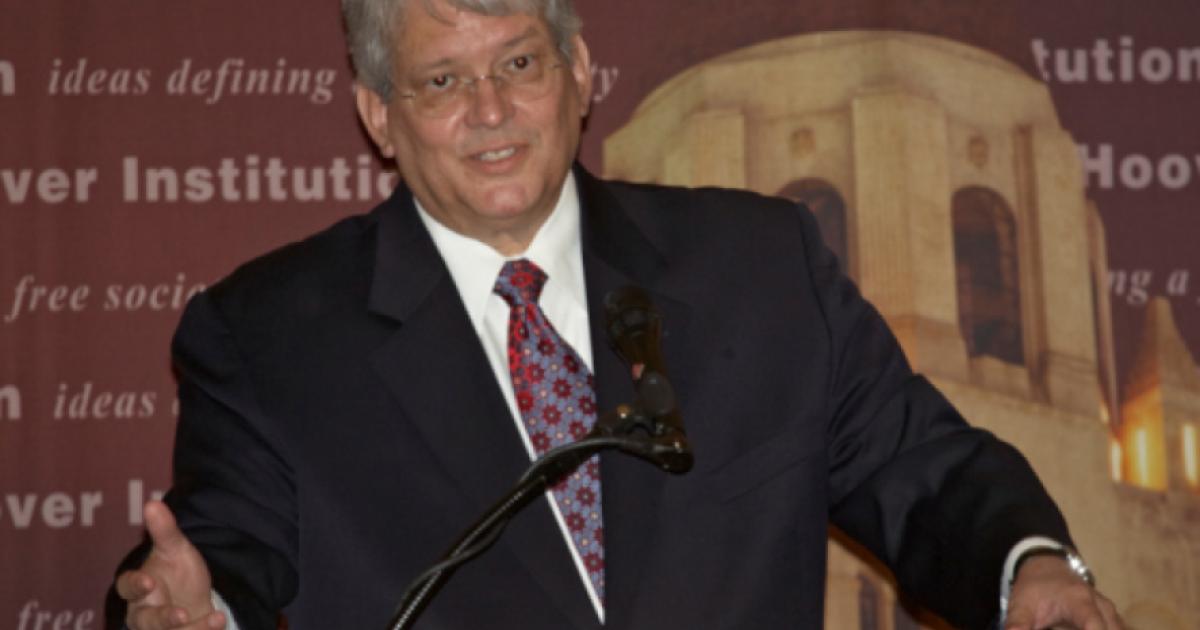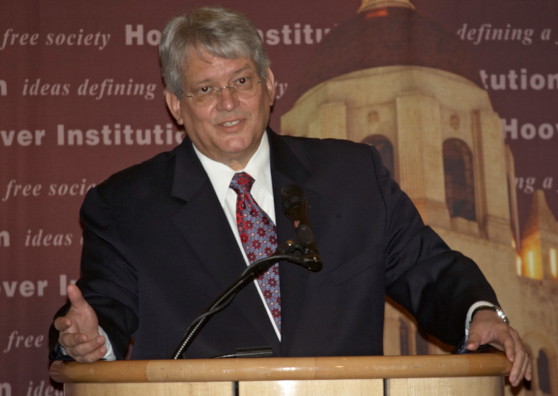
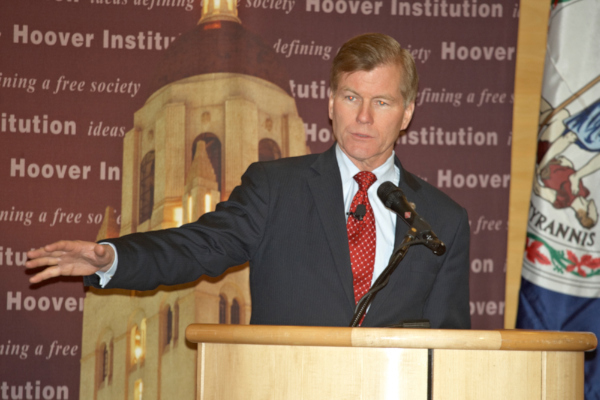
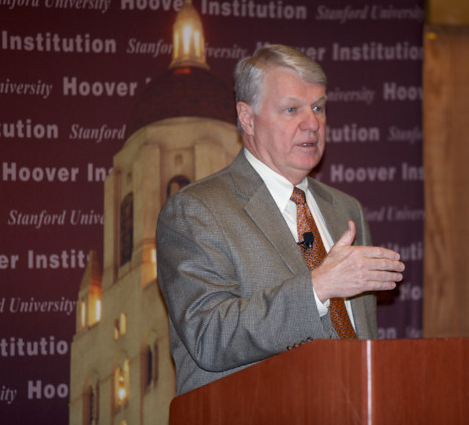
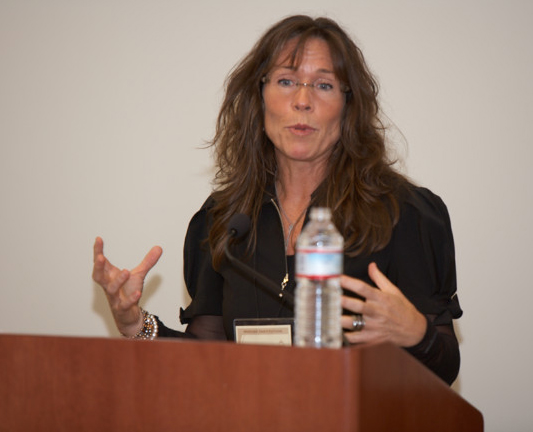
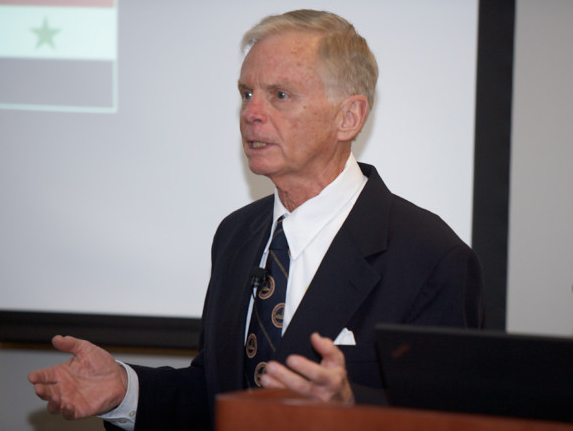
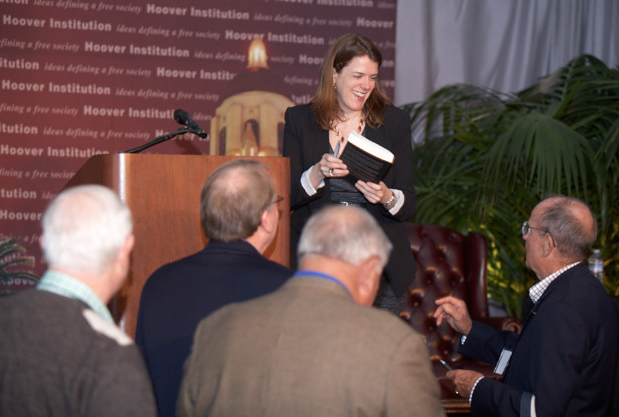
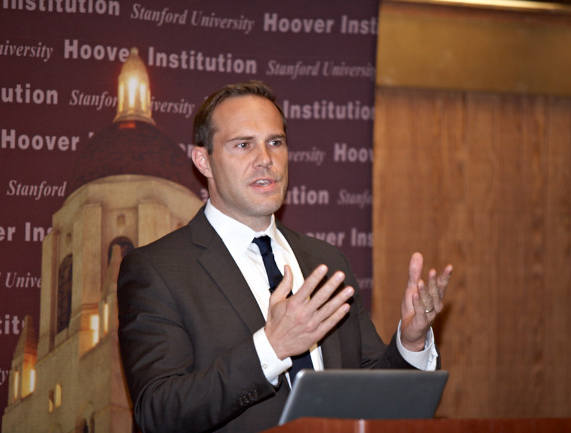
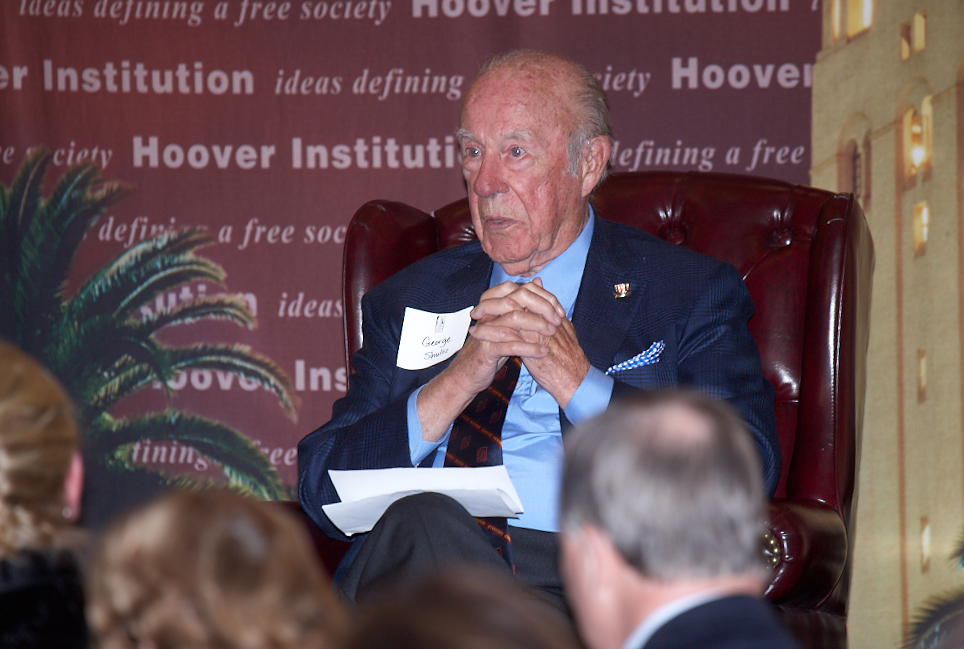
The Hoover Institution hosted its fiftieth retreat, beginning on Sunday, October 21, 2012, and ending on Tuesday, October 23, 2012. On Sunday, the Honorable Bob McDonnell, governor of the Commonwealth of Virginia since January 2010 who also currently chairs the Republican Governors’ Association, the Southern Growth Policies Board, and the Southern Regional Education Board, gave the before-dinner remarks. His topics included job creation, economic development, our current debt crisis, and deficit spending. He also touched on two competing visions in the world; the first, which he calls an “entitlement society” with more guarantees, more taxes, more spending, and more regulation as a way to promote success; the second, an “opportunity society” which individuals can work hard, dream big, and use all their talents to be successful with limited government interference. “To help to chart a better course long term, for the $16 trillion in debt and growing, we have got to have structural reform in the way states and the federal governments do business,” McDonnell stated.
John Raisian, the Tad and Dianne Taube Director, gave welcoming remarks on Monday, October 22, during which he discussed media tutorials, the current exhibit, The Battle for Hearts and Minds: World War II Propaganda (located in the Exhibit Pavilion), Milton Friedman and his legacy at Hoover, and a quick overview of the Hoover Institution.
Nicholas Eberstadt, the Henry Wendt Chair in Political Economy at the American Enterprise Institute, talked about his newly published book A Nation of Takers: America’s Entitlement Epidemic in his speech. The winner of a Bradley Prize in 2012, his research and writing focus on economic development, foreign aid, global health, demographics, and poverty. Using a Powerpoint presentation, Eberstadt presented graphs and figures illustrating his ideas on the future of entitlements. He defined entitlements according to the government definition as “payments to individuals by government for which no current service is performed.” The number of programs has increased to more than two hundred, and the “payments have exploded over the last fifty years,” stated Eberstadt. The US federal government, having become an “entitlement machine,” according to Eberstadt, is a large problem that, needs fixing.
Joshua Rauh, a senior fellow at the Hoover Institution and a professor of finance at the Stanford Graduate School of Business, gave a talk titled, “Debt in Disguise: The Crisis in Public Employee Pensions.” Rauh began by explaining how to arrive at a balanced budget and how much the government sets aside for pension funds. He gave an example showing “debt and expected returns” and explained why looking at the historical asset performance figures will not necessarily predict the outcome, even though the Governmental Accounting Standards Board states that they will. “On an ongoing basis, we are far understating the costs of state and local government pension programs,” stated Rauh. Serious reforms are needed in this area, said Rauh, in order to fund pensions.
James Ceaser, a senior fellow at the Hoover Institution and a professor of politics at the University of Virginia, talked about the upcoming election in his speech titled “Crossroad: The Stakes in the 2012 Elections.” Ceaser discussed his study of all the facts about the polls for the upcoming election. He cannot predict the winner but gave four possible outcomes. Scenario 1 he called “Hanging On” in which there would be a large Obama victory and the president would “keep what he has achieved.” Scenario 2, titled “Vindication,” says that President Obama would have a narrow victory, possibly capturing the electoral vote but not necessarily the popular vote. Scenario 3, titled “Reversal,” has Governor Romney winning the election by a narrow margin. Scenario 4, titled “Game Changer,” would have Governor Romney scoring a large victory over President Obama. Ceaser concluded by discussing the possible repercussions of each scenario.
John Taylor, the George P. Shultz Senior Fellow in Economics at the Hoover Institution, discussed his new book Government Policies and the Delayed Economic Recovery(Hoover Institution Press 2012), coedited with Lee Ohanian, a senior fellow at the Hoover Institution and a professor of economics and director of the Ettinger Family Program in Macroeconomic Research at the University of California, Los Angeles, and Ian Wright, a PhD student in the Department of Economics at Stanford University and a recipient of the Shultz Graduate Student Fellowship in Economic Policy. Taylor began with a personal anecdote about his being a PTA member many years ago and trying to help balance the PTA budget and get things in the school system on track; after bringing the nonpartisan community together, the decision to close down certain schools was overturned. He then related his story to the current economic system today: If we can all come together, then the recovery can move at a faster pace. Taylor, using charts and graphs to illustrate his points, stressed the following: the federal debt-to-GDP ratio is showing no improvement, regulation is an important factor, and federal spending as a share of GDP has not developed. He emphasized the need to get away from “short termism,” to increase trade policy and agreements, and to think about education in the long term. “History tells us, economics tells us, change and policy will generate more demand and more supply. That’s why I think it’s so important that we do what that school board did: change policy,” concluded Taylor.
The Monday breakout afternoon sessions included a number of speakers. Ken Jowitt, the Pres and Maurine Hotchkis Senior Fellow at the Hoover Institution and the Robson Professor of Political Science at the University of California, Berkeley, gave a speech titled “How Important Is the Middle East?” Gary Roughead, an Annenberg Distinguished Visiting Fellow at the Hoover Institution, gave a talk titled “Sequestration: Defense Budgeting with an Ax.” Kori Schake, a research fellow at the Hoover Institution and an associate professor of international security studies at the United States Military Academy, discussed her book, State of Disrepair: Fixing the Culture and Practices of the State Department (Hoover Institution Press 2012).
Jennifer Burns, an assistant professor of history at Stanford, gave a talk titled, “Ayn Rand and the Intellectual History of Conservatism.” Thomas Henriksen, a senior fellow at the Hoover Institution, discussed “America and the Rogue States” in his speech. Joseph Rago, an editorial board member of the Wall Street Journal, gave a talk titled “The New Fatal Conceit: Technocracy, Prices, and US Health Care after the Affordable Care Act.”
Abbas Milani, research fellow and codirector of the Iran Democracy Project at the Hoover Institution, talked about “Iran’s Nuclear Program: Problems and Prospects.” Jonathan Rodden, a senior fellow at the Hoover Institution and a professor in the Political Science Department at Stanford, gave a talk titled “The European Debt Crisis in Comparative Perspective.”
On Monday evening, George P. Shultz, the Thomas W. and Susan B. Ford Distinguished Fellow at the Hoover Institution, gave before-dinner remarks titled “A Constructive Agenda.” Before discussing his topic for the evening, Shultz spoke about both presidential candidates and their strategies during their last debate, which preceded the dinner. Shultz then talked basic principles the United States must invoke to strengthen our economy, including a sense of strategy, a consistent policy atmosphere, not intervening in processes that should naturally take place, and a fair groundwork to promote equality and opportunity. He also touched on such significant ideas as reforming the personal income tax, the notion of bonding, the nuclear power industry, Social Security, and universal health care. “If you want me with you on the landing, include me in the takeoff,” concluded Shultz, referring to people working together to get the economy in a better place.
On Tuesday, October 23, 2012, Kimberley Strassel, a member of the editorial board of the Wall Street Journal since 2005, gave a talk titled “Two Weeks to Go: Where We Stand in the Final Countdown to the 2012 Elections.” Strassel began by explaining where the United States stands today and looking back at the last four years of President Obama’s term in office, including picking apart his word usage during the debates. She continued by looking at Governor Romney’s “traditional reference campaign” and how the debates have affected his numbers in the polls. Strassel discusses the entitlement debate, comprehensive tax reform, and the future of the House and the Senate. She also emphasized campaign fundamentals and “how money matters in politics.”
Fouad Ajami, senior fellow at the Hoover Institution and the cochair of the Herbert and Jane Dwight Working Group on Islamism and the International Order, gave a talk titled “Hubris Undone: The Islamic Tutorial of Barack Obama.” Ajami began his talk with a short clip from a video titled Class Dismissed, a 2009 documentary by Adam B. Ellick profiling Malala Yousafzai, a Pakistani girl whose school was shut down by the Taliban and, because of her speaking out in thevideo, was shot on a school bus and is currently fighting for her life. Ajami used this video to show the “true story of the Islamic world.” He went on to discuss Obama’s foreign policy and engagement in the Islamic world, the war in Afghanistan, the past and current polls, and Syria, the main subject of his book The Syrian Rebellion (Hoover Institution Press 2012).
John Cochrane, a professor of finance at the University of Chicago’s Booth School of Business and a senior fellow at the Hoover Institution, discussed Dodd-Frank in his talk titled “Toward a Run-Free Financial System: How to Repeal and Replace Dodd–Frank.” Cochrane, in explaining financial regulation and the Dodd-Frank bill, talked about how resolution authority was a central part of the bill. He went on to explain that the problem in the financial crisis was that the central feature was “the run.” “Without a run, you don’t have a crisis,” stated Cochrane. The run included three ingredients: contracts that promise fixed value, the act of pulling out of a bank, thus making the bank weaker, and social costs. His examples included short-term debt and the current $16 trillion debt.
The event concluded with a panel discussion on the “Public Opinion and the Race to 270” that included David Brady, deputy director and Davies Family Senior Fellow at the Hoover Institution; Douglas Rivers, senior fellow at the Hoover Institution and a professor of political science at Stanford University; and Daron Shaw, a University Distinguished Teaching Professor in the Department of Government at the University of Texas, Austin, where he teaches courses on American government, campaigns and elections, political parties, and public opinion and voting behavior. Brady’s remarks concerned the upcoming election and how the candidates performed during the debates. He then introduced his fellow panelists, Rivers and Shaw. Rivers used Powerpoint slides to illustrate the political science literature on the state of the economy and both charts and figures to show the state of the economy, candidate perceptions according to the polls, the polls before and after the debate, and his prediction on the race to 270 electoral votes. Shaw concluded the panel discussion with three main points: “Macro-factors do not point decisively one way or the other. Obama has more pathways to victory, but Romney’s situation has improved in the past two weeks. Romney has outworked Obama, [but] Obama has outspent Romney.” Shaw also used bar graphs and charts to depict the voting differences between Democrats and Republicans and illustrated the Electoral College strategy with colored maps that painted a possible picture of the upcoming election.
Click here to view the October 2012 retreat agenda.







